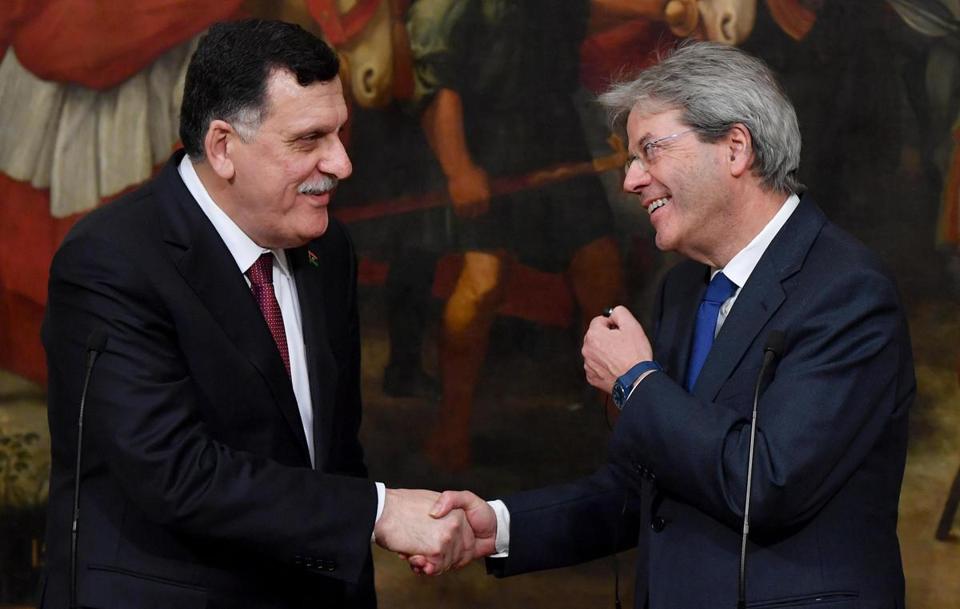Cairo – A new opportunity for dialogue between Libyan Army generals has emerged a few days ago, the first of its kind since the armed uprising that toppled the regime of Muammar al-Gaddafi in 2011.
Away from the spotlight, a group of Libyan politicians and activists are now hoping to see concrete rapprochement between the generals of armed forces to save the country from chaos, amid fears of foreign interference in their internal affairs.
During Gaddafi’s era, the army was united. It later saw severe divisions due to disagreements between senior officials over NATO’s intervention. Since then, several military leaders have engaged in internal wars, leading to the deterioration of Libya’s security, political and economic situations.
In the wake of mounting concerns over the spread of terrorist groups and the likelihood of foreign military intervention, the United Nations, along with Egypt, Tunisia and Algeria, are devoting extensive efforts to help the Libyan people overcome the current deadlock.
In front of a fancy hotel near Cairo International Airport, a Libyan general, in a black suit and a red tie, told reporters smiling: “We have not yet agreed on a vision; we are still testing the path.” In the same evening, another meeting was held in a hotel located on the shores of the Nile between three brigadier generals: the first one is a military leader in the city of Misrata, who was a supporter of NATO’s intervention to oust Gaddafi. Years of war and tremendous human and economic losses have exhausted him.
The second officer is from city of Zintan, southwestern Tripoli. He was not only a NATO supporter, but also allowed the dropping of arms coming from a foreign country, to armed rebels who used to call themselves “revolutionaries”.
In a brief statement, that officer said it was the right time for the military institution to get unified and launch dialogue away from political bickering.
Although those two leaders have fought together to topple Gaddafi’s regime, disputes arose between them since the beginning of 2014 due to conflicts over power sharing in the Libyan capital.
Today, each one of them is trying to turn the page of the past and look towards the future. However, they have concerns over the increasing “Italian activities in many Libyan areas under the pretext of facing illegal migration”.
The third officer is from Benghazi. He is close to General Khalifa Haftar, the commander of the National Libyan Army. Haftar was also a NATO supporter; but when he announced three years ago his plan to reorganize part of the army, he was faced with staunch opposition from several military leaders in western Libya, including Misrata and Zintan.
A look on Haftar
Haftar’s efforts have forced his opponents to reconsider their choices. Military officials, who were close to Gaddafi’s regime, have offered to help Haftar fight armed and extremist organizations.
The UN, for its part, has worked to produce a political solution, known as the Skhirat agreement. However, the presidential council, which was formed in line with this agreement, has failed to resolve governance issues in Libya.
This has led to the creation of three governments and three parliaments in the African country.
In the west part of the country, we find the “National Accord” government, which is headed by Fayez al-Sarraj, and the “Salvation” government, presided by Khalifa al-Ghawil. In the East, we find the “permanent government” headed by Abdullah Al-Thinni.
As for parliaments, in Tripoli, the General National Congress (former parliament) is led by Nouri Abu Sahmain, the State Council (part of the former parliament), is presided by Abdul Rahman Sewehli; and in Tobruk, Aguila Saleh heads the current parliament.
Armed groups fighting one another back all of these political and legislative institutions.
On the other hand, since the beginning of the Libyan crisis, regional and international diplomats and officials were communicating with internal parties, trying to mend fences between the different political groups.
Several meetings were held between Libyan generals, with Egypt and Tunisia mediating negotiations.
Tunisia has actively participated in facilitating a meeting between Saleh and Sewehli, held in the Italian capital last week.
In this regard, well-informed Egyptian sources said that Libya’s neighbors and other powers supporting peace in the African country, are taking advantage of the state of exhaustion that has prevailed over the political life to push the Libyans to unify their army and forge an agreement between the senior military leaders.
Saleh and Sewehli meeting
Although the meeting between the two generals did not produce any relevant outcome, it has shown that leaders of the East and those of the West can actually communicate and work towards a possible agreement.
Moreover, the generals’ meeting in Cairo has underlined three important points:
* Extensive and unprecedented efforts are deployed by military leaders to unify the Army ranks;
* Support to the national civil movement which is calling for dialogue, and;
* The growing of a moderate wing in the Islamic movement, in parallel with the exclusion of extremists.
